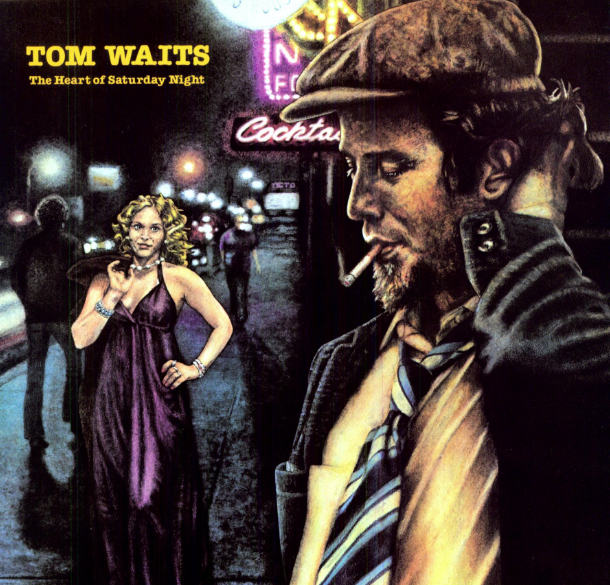

Having found the perfect foil for this point in his career, in jazz drummer-turned-producer ‘Bones’ Howe, Waits builds solidly on the promise of his debut, Closing Time , still drawing on the pool of songs he had in his bag before he secured a deal, but also adding to his repertoire.
Amongst the best tracks is the title number, in which Waits voice and guitar are ably complemented by the sinuous serpentine bass of Jim Hughart, traffic and other incidental noises adding to the evocative effect. I believe the fabulous bass part may have evolved when Waits was working with bassist Bill Plummer, and Tom’s guitar part, in drop-D tuning, is the essence of Waits as self-accompanist: it seems, indeed it is in some ways, very simple, but it’s also absolutely perfect. And that’s not so easy! Over the span of his career Waits turns in some truly sublime turns on piano, guitar and vocals, not to mention songwriting, and it’s all done with understated panache. He’s not a virtuoso, technically speaking, in any of these departments, and yet he gets more emotion and meaning across than many a technician could possibly achieve. That’s the ‘art’ part of the deal, it’s about feel, and is almost magical.
Amongst the stellar sidemen Howe brought Waits together with, not only are the notable rhythm team of bassist Jim Hughart and drummers Bill Goodwin or Shelly Manne, worthy of special mention, so to is arranger Bob Alcivar, whose lush cinematic arrangements work perfectly with Waits’ sophisticatedly sleazy material. Trumpeter Jack Sheldon and sax players Pete Christlieb and Frank Vicari, also help bring the jazz dimension of Waits at this time into sparkling 3-D. Waits would continue to work with these guys to great effect over a number of years, releasing some music that is, in my view, amongst the greatest committed to wax in the latter part of the 20th century.
The material is of a very high standard throughout, although it’s not all even. Some pieces flesh out spoken word raps that he was delivering in his early gigging days, often accompanied only by his own toe-tapping and finger-popping. On wax, such numbers as ‘Diamonds On My Windshield’ and ‘Ghosts of Saturday night’ make the transition with admirable aplomb. Waits develops the bluesier side begun with ‘Virginia Avenue’ and ‘Ice Cream Man’, with the fabulous ‘New Coat Of paint’, a rarity in the Waits cannon for the use of the rich tremolo Rhodes (did Waits play this? no other keys player is credited), ‘Semi-Suite’, ‘Fumblin’ With The Blues’ and ‘Depot, Depot’.
His maudlin melancholy, replete with honeyed strings courtesy of Alcivar, finds expression in ‘San Diego Serenade’, the more minimal title track, ‘Please Call me Baby’, and ‘Drunk On The Moon’, this last of which goes into an out and out jazzy swing section for sax and trumpet solo sections, before resuming the more downbeat song. Kerouac experimented with mixing his words with music, and his writing was itself influenced by the jazz music and life, but Waits brings the two together more successfully. This is the Waits that some critics, and Waits himself, seem keen to distance themselves from: the boozy romantic barfly. Sure, it can seem ripe for parody, and indeed, some, including Waits himself, worried that this was where he was headed, hence a later-career shift in direction. But for me this is, for all it’s knowingly self-aware louche cleverness, disarmingly innocent and beguiling. In short, I love it: highly recommended.
